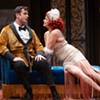Published October 26, 2005 at 11:28 p.m.
Alas, poor Cyrano! The 17th-century French poet and soldier who inspired one of the most enduring, lovelorn characters in literary history is best remembered for his nose. Without access to rhinoplasty, the excessively endowed nobleman had no way to prune his prominent proboscis, to shorten his shocking schnoz.
The dashing yet deformed hero ignited the French imagination when Edmond Rostand's "based-on-the-true-story" play, Cyrano de Bergerac, premiered in 1897. Although Cyrano's glaring physical defect keeps him from his true love, it forces him to cultivate other qualities. The art of self-deprecation hones his razor-sharp wit; self-defense becomes reckless bravery. Skilled with sword and word, Cyrano embodied values from a nobler time.
The play was an instant sensation, with 42 curtain calls on opening night. It also reinvigorated Gallic pride, which had been wounded by a humiliating defeat in the Franco-Prussian War and further muddied by the sordid Dreyfus Affair scandal. "It is good that a people should once again hear the sound of its own enthusiasm," Rostand said at his almost-immediate induction into the elite Academie Française. "In the theater souls, side by side, can feel like they have wings."
In the century since, Cyrano has inspired operas, overtures, musicals and films, with memorable long-beaked lead performances from actors such as Jose Ferrer, Steve Martin and Gerard Depardieu. This fall, Weston Playhouse Company is touring New England with Jo Roets' Cyrano, a 1996 adaptation that distills the essence of Rostand's theatrical epic: the story of a man who feels unlovable, yet loves deeply.
Stephanie Gilman's artfully directed production shows that concentrating on Cyrano's poignant and painful unrequited love for Roxanne intensifies the modern resonance of his story. Today, we may not care much about the French travails and triumphs -- literary, culinary and military -- that Rostand so lavishly depicts. But most of us can relate to the gut-wrenching rollercoaster of heartbreak: the rush of desire, crushing self-doubt, soaring hope, dashed dreams.
By paring the pageantry and eliding or eliminating secondary characters, Roets trimmed Rostand's original considerably -- from three and a half hours to 75 minutes, and from 50 roles to just 10. In the Weston production, the small company performed in the style of a traveling troupe of players, with two of the three actors assuming multiple roles. The action unfolded on a single set, with new locations signaled by modest prop changes or brief passages of narration. The performers manipulated set and costume elements within full view of the audience.
Cyrano paints one of the most memorable and bittersweet love triangles in the history of literature. Cyrano loves his cousin Roxanne, "the most beautiful woman on earth -- the cleverest, the most intelligent, the kindest." But he knows his nose takes him off her romantic radar screen. Indeed, Roxanne and pretty boy Christian have fallen for one another without ever having exchanged a word. Christian is a cadet in Cyrano's regiment, and Roxanne asks him to help protect her beloved and secure communications between them.
Christian has plenty of snappy digs to dish out about Cyrano's tuberous trunk, but he gets writer's block at Roxanne's request for a letter. Fortunately, Cyrano has poured his heart out on paper, and he lends Christian his bon mots. Their eloquence inflames Roxanne's passion, and Christian comes to rely on Cyrano's words -- first on parchment and eventually in person.
In the famous nighttime balcony scene, Christian thinks he has learned enough from Cyrano to make verbal love to Roxanne on his own. But he fumbles badly, and she is not amused. "Please stop it! My ears are in pain. What has happened to that brilliant oratorical talent of yours? Where are those finely-wrought sentences, those well-chosen metaphors, those words that could only come out of your pen, your mouth, your heart?"
Cyrano steps in, at first prompting Christian from the shadows, then taking over when Christian can't keep up with Cyrano's passionate poetry. But when the time comes to go in for the kiss, it's Christian who climbs over the railing. Cyrano's heartbreak is huge; his consolation, small: "There's one crumb of comfort I can savor: She kisses, on his mouth, the words I gave her."
An older, more powerful man is pursuing Roxanne as well, the odious Comte de Guiche. To protect her from a forced marriage to de Guiche, Cyrano helps Roxanne and Christian elope. As punishment, de Guiche ensures that Cyrano and Christian's regiment is immediately sent on a dangerous military assignment, with tragic results.
To those whose lingering mental image of Cyrano is a silly-snouted Steve Martin, it may be hard to remember just how tragic the frustrated nobleman's tale ultimately is. Andrew McGinn played Cyrano with dynamism and sensitivity: confident when engaging in swordplay, and cocky when parrying wordplay, but heavy with the tenderness, longing and sorrow that envelope Cyrano because he feels he is ugly, and therefore unlovable. Especially in this slimmed-down form, Cyrano is a tragedy of barely-missed connections, and McGinn conveyed well the fleeting moments when Cyrano considers another path: that Roxanne might love him, that he should declare his love -- honor be damned -- and risk rejection.
Roxanne must be just flighty enough to be oblivious to these potential openings in their relationship, without being an airhead undeserving of Cyrano's lifelong passion. Amanda Cobb made a vivacious and energetic Roxanne, worthy of the male machinations that drive the play's plot. She showed the sheltered noblewoman's girlish impulsivity, but also her more womanly side: Christian/Cyrano's letters send her into an almost sexual rapture. Love helps Roxanne mature, and Cobb conveyed her character's emotional growth by carrying herself more assertively as the play progressed.
Noel Velez played Christian with credible charm. But he was simply brilliant performing the half dozen secondary characters, who serve as comic foils, adopting distinct voices and oddball mannerisms to distinguish them. His villainous de Guiche pranced and preened, always holding out an embroidered handkerchief as a symbol of his refinement, while sometimes grooming his facial hair with a plastic mustache comb. Paunchy pastry chef Ragueneau had a pillow visibly tied to his waist, while the stooped and shuffling Capuchin monk was a genetic cross between Snow White's dwarf Dopey and Gilbert Gottfried.
Director Gilman has brought Cyrano to life with a wealth of creative touches. According to Weston's producing director Steve Stettler, Gilman and her cast improvised and collaborated to develop some of this production's most memorable vignettes, such as the love triangle's slow-motion ballet exchange of billets-doux, and de Guiche's hilarious ukulele-accompanied attempt at composing a love song.
Wilson Chin's innovative set conveyed a sense of playfulness, constructed from cast-off materials and full of quirky, anachronistic props. Wooden pallets were the primary building blocks of a half-round wall that established the main space. By simply changing a banner or flag, the wall became the inside of Ragueneau's patisserie or an exterior battlefield rampart. A row of paint cans converted into footlights lined the front of the stage. In some scenes lighting designer S. Ryan Schmidt threw giant vaudevillian shadows on the side walls to mimic the effect of the real gas footlights of Rostand's era.
One of the delights of this Cyrano is its comfortable, self-aware theatricality. We see McGinn put on Cyrano's nose just before the play begins. Roxanne's carriage is a Razor Scooter. These cheerful incongruities make us feel welcomed, as a full-fledged staging of Rostand's cast-of-thousands spectacle might not.
They also leaven the story's sadness, but only briefly. Because heartbreak hurts, in any century. Today we have plastic surgery to alter an errant physical feature, but the crushing fear of being unworthy of love, unfortunately, is scalpel-proof.
More By This Author
Speaking of...
-

Executive Director Kurt Thoma Leaves Barre Opera House
Mar 5, 2024 -

Vermonter's Musical Bound for Broadway With Hillary Clinton as a Producer
Oct 25, 2023 -

Phantom Theater Finds New Winter Venue in Waitsfield
Oct 13, 2023 -

Double E 2023 Summer Concert Series Kicks Off With the Wailers
Mar 17, 2023 -

Off Center for the Dramatic Arts to Reopen in the New North End
Sep 23, 2022 - More »
Comments
Comments are closed.
From 2014-2020, Seven Days allowed readers to comment on all stories posted on our website. While we've appreciated the suggestions and insights, right now Seven Days is prioritizing our core mission — producing high-quality, responsible local journalism — over moderating online debates between readers.
To criticize, correct or praise our reporting, please send us a letter to the editor or send us a tip. We’ll check it out and report the results.
Online comments may return when we have better tech tools for managing them. Thanks for reading.













































